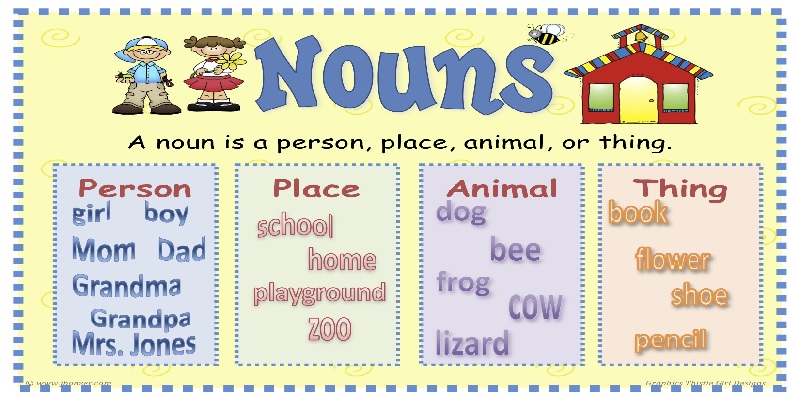
Nouns
For the matter of fact, we don’t even complete our sentences with using nouns. Without the use of these nouns, no one can create a meaningful sentence. If you wish to talk about any place then, that place is a noun. Or if you wish to speak to a person then that specific person himself is a noun. If you wish to talk about any community or a group then that group falls under nouns. If you want to know about any monument such as Taj Mahal then that monument is also a noun. But the question is that what actually are “Nouns"?
Definition of Nouns
The definition of a noun is as follows:
Nouns are the words or word groups which are used in the identification of any class of people, things, place or an idea. Nicola Tesla, Chennai, Ring, Table, Gujarat, Shah Rukh Khan, Chris Hemsworth, Delhi, Narendra Modi all are examples of noun.
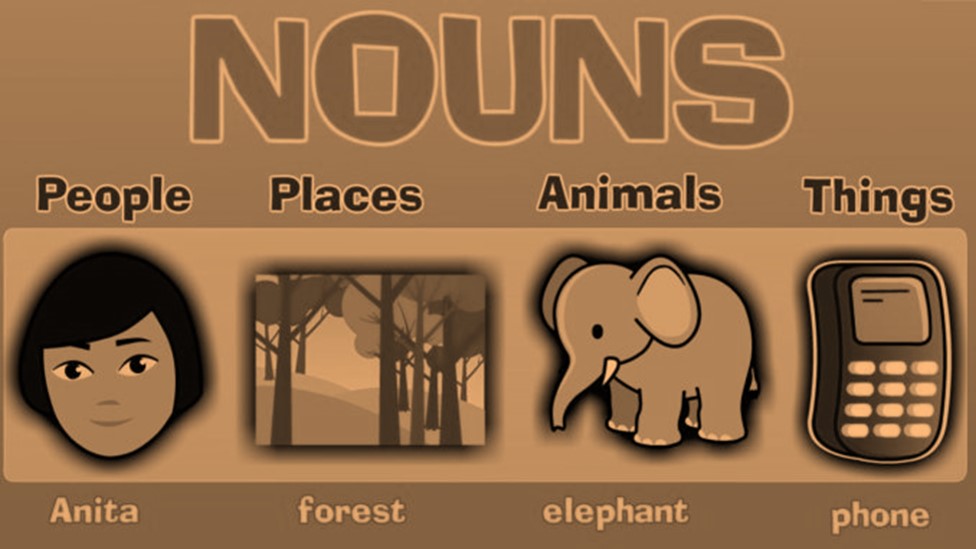
Classification of Nouns
For simplicity, nouns are classified into two types that is common noun and proper noun, but the actual classification of nouns includes its six types.
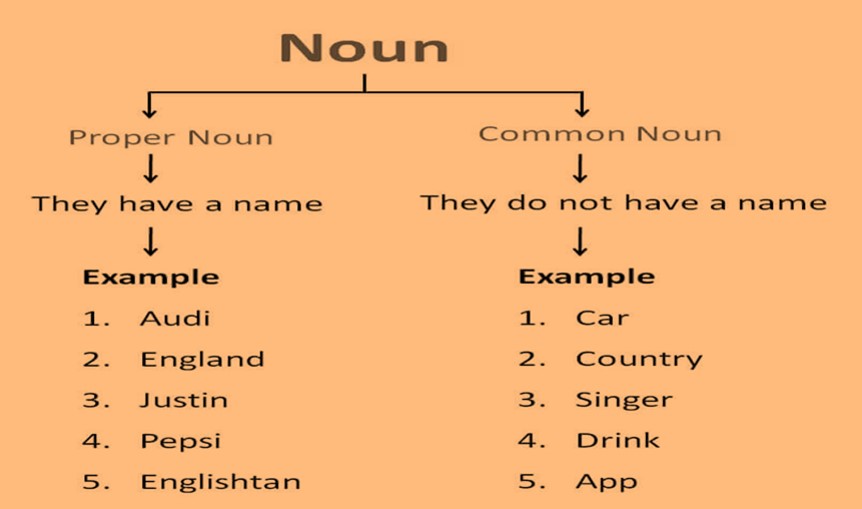
When students reach higher classes then, they are taught that the nouns are of four types namely common noun, proper noun, abstract noun and collective noun.
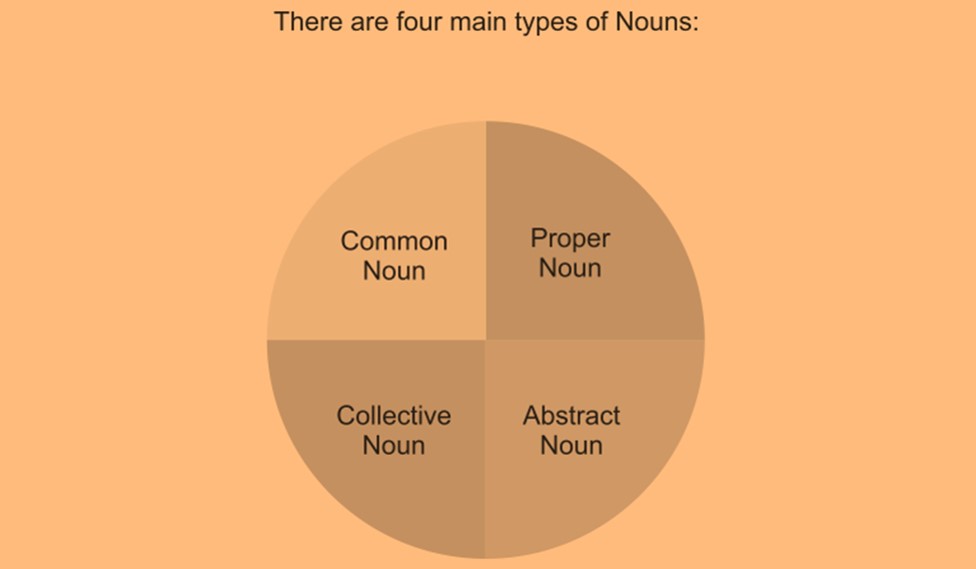
Nouns are broadly classified into six categories namely,
Now, we will know about all these nouns one by one.
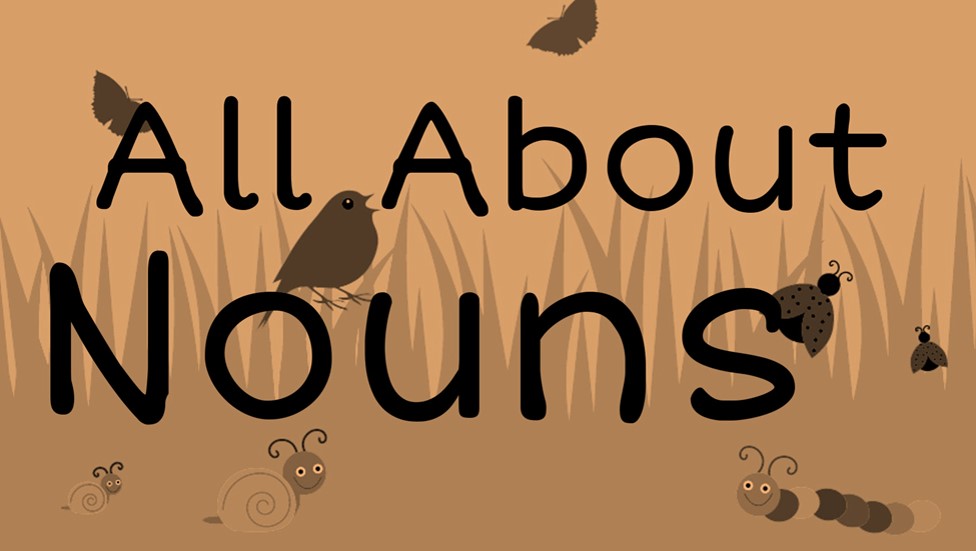
Common Noun
A common noun is defined as the names which are given to an object, person or to any place.
The examples of common noun are girl, elephant, country, flag, knife, box etc.
Proper Noun
Proper nouns are quite specific and are used to indicate the particular person, place, thing or an object.
Anand, Krishna, Siddharth, India, Anushka, Tiger, Delhi, Taj Mahal, Lion are all the examples of proper noun.
Compound Noun
When two or more words combine to form a noun, they are called as compound Noun. They are written in one word, separated words and hyphenated words. The examples for the same are as follows:
One Word: Iceland, Daydream, Newspaper
Separated Words: Prime minister, Fire Drill, Compact Disc
Hyphenated Words: Sister-in-law, pull-up, self-esteem
Collective Noun
The word collective itself indicates collection, so when we talk of a collection of things or a group of people we are basically referring to the Collective noun.
For example, team, heard bunch, family, class.
Concrete Noun
A concrete noun is one of the easiest nouns. These are the nouns which one can physically see or touch. Every day you come across thousands of concrete noun.
If you will try to look around in your surrounding then you will find wall hangings, clothes, windows which are all the examples of the concrete nouns. It also includes some rare terms such as fossils, toothpicks etc.
Abstract Noun
The word abstract means something which exists in thought or an idea but has no existence in reality. So, an abstract noun that is they cannot be seen or touched.
Wisdom, honesty, faith, time, truth, danger all are the examples of abstract nouns.
Now try to identify the nouns in the following sentences:
In the first sentence, Siddharth is a proper noun and boy is a common noun.
In the second sentence, Taj Mahal and Indian are proper noun, while monument is the common noun.
In the third sentence Wisdom and strength, both are abstract nouns.
In the fourth sentence pack of cards is a collective noun and the table is a common noun.
(i) Nouns are defined as words or group of words used to identify people, things, place or an idea.
(ii) Common nouns names which are given to an object, person or to any place.
(iii) Proper nouns are used to indicate the particular person, place, thing or any object.
(iv)Abstract nouns refers to the ideas, conditions and the quality which have no physical existence
(v) Collective nouns talk of collection of things or a group of people.
(vi)Concrete nouns are those which one can physically see or touch.
(vii) Compound Noun are formed by the combination of two or more words.
So, this was all the basics of nouns. Hope this makes your concepts clearer!
Q.1 |
Select the nouns from the following sentences. The window was broken. |
| a) | Broken |
| b) | The |
| c) | Was |
| d) | Window |
Q.2 |
Select the noun from the following sentence. The foolish old crow tried to sing. |
| a) | Sing |
| b) | Foolish |
| c) | Old |
| d) | Crow |
Q.3 |
Select the noun from the following sentence. The whole sum was expended. |
| a) | Expended |
| b) | The |
| c) | Whole |
| d) | Sum |
Q.4 |
Select the nouns from the following sentences. Sunday is the first day of the week. |
| a) | Sunday |
| b) | Day |
| c) | Week |
| d) | All of these |
Q.5 |
Select the noun from the following sentence. Most boys like cricket. |
| a) | Most |
| b) | Boys |
| c) | Cricket |
| d) | Both B & C |
Q.6 |
Select the nouns from the following sentences. There are several mistakes in your exercise. |
| a) | Several |
| b) | Mistakes |
| c) | Exercise |
| d) | Both B & C |
Q.7 |
Choose the most appropriate noun(s) for the following sentence. His ______ stopped working. |
| a) | Umbrella |
| b) | Car |
| c) | Phone |
| d) | All of these |
Q.8 |
Choose the most appropriate noun(s) for the following sentence. Japanese are hardworking _______. |
| a) | Girls |
| b) | Boys |
| c) | Animals |
| d) | People |
Q.9 |
Fill in the blanks using correct nouns in the following sentences. The ______ rotates on its own axis. |
| a) | Orange |
| b) | Apple |
| c) | Ball |
| d) | Earth |
Q.10 |
Fill in the blanks using correct nouns in the following sentences. The ______ towards his country saved him. |
| a) | Door |
| b) | Beauty |
| c) | Disgust |
| d) | Patriotism |
Your Score: 0/10
Yearlong program for Olympiads preparation & to build necessary skills for future.
Explore More
Time to mark your calendar with the upcoming Olympiads exam schedule.
Explore More
Take your Olympiad preparation to next-level by taking LIVE Classes.
Explore More
Assess your performance by taking topic-wise and full length mock tests.
Explore More
Online tuitions for international compeitions like SASMO, SEAMO, etc for Grades 1-11.
Explore More